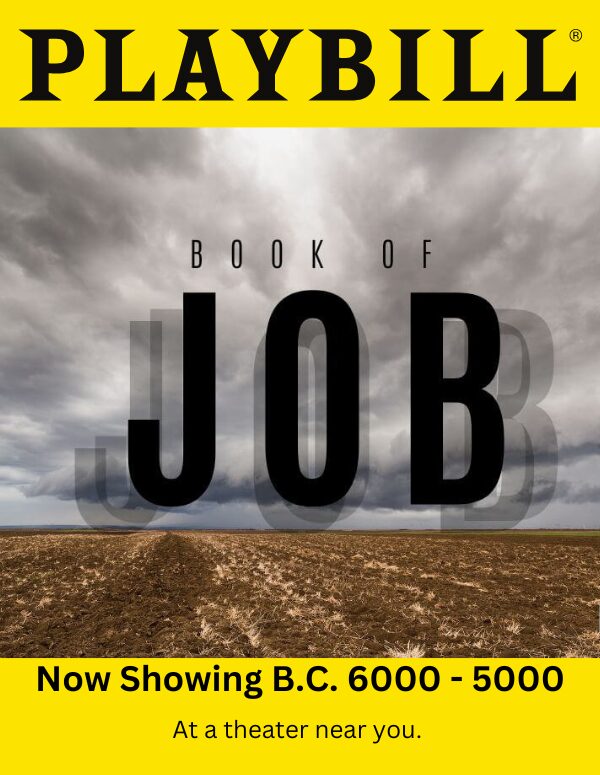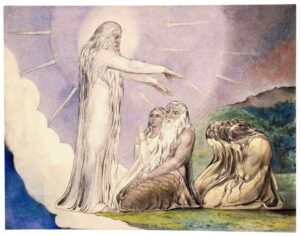
Should the book of Job be read as a true story, a biblical fable or a play? It has all the makings of a reluctant hero. This story makes the best of us question our own faithfulness. Do we measure God’s goodness only in terms of health and wealth and prosperity?
Job 42:1-17
Then Job answered the Lord and said,
2 “I know that You can do all things,
And that no plan is impossible for You.
3 ‘Who is this who conceals advice without knowledge?’
Therefore I have declared that which I did not understand,
Things too wonderful for me, which I do not know.
4 ‘Please listen, and I will speak;
I will ask You, and You instruct me.’
5 I have heard of You by the hearing of the ear;
But now my eye sees You;
6 Therefore I retract,
And I repent, sitting on dust and ashes.”
God Is Displeased with Job’s Friends
7 It came about after the Lord had spoken these words to Job, that the Lord said to Eliphaz the Temanite, “My wrath is kindled against you and against your two friends, because you have not spoken of Me what is trustworthy, as My servant Job has. 8 Now therefore, take for yourselves seven bulls and seven rams, and go to My servant Job, and offer up a burnt offering for yourselves, and My servant Job will pray for you. For I will accept him so as not to do with you as your foolishness deserves, because you have not spoken of Me what is trustworthy, as My servant Job has.” 9 So Eliphaz the Temanite, Bildad the Shuhite, and Zophar the Naamathite went and did as the Lord told them; and the Lord accepted Job.

God Restores Job’s Fortunes
10 The Lord also restored the fortunes of Job when he prayed for his friends, and the Lord increased double all that Job had. 11 Then all his brothers, all his sisters, and all who had known him before came to him, and they ate bread with him in his house; and they sympathized with him and comforted him for all the adversities that the Lord had brought on him. And each one gave him a piece of money, and each a ring of gold.
12 The Lord blessed the latter days of Job more than his beginning; and he had fourteen thousand sheep, six thousand camels, a thousand yoke of oxen, and a thousand female donkeys. 13 He also had seven sons and three daughters. 14 He named the first Jemimah, the second Keziah, and the third Keren-happuch. 15 In all the land no women were found as beautiful as Job’s daughters; and their father gave them inheritances among their brothers. 16 After this, Job lived 140 years, and saw his sons and his grandsons, four generations. 17 And Job died, an old man and full of days.
Should we view the Book of Job as the fictional theater of its day? Like many biblical stories—such as a talking snake, a man living inside a fish for three days, or a sea splitting in two—we face a choice when we encounter these wondrous events. Do we understand them literally or figuratively?
Now Playing on Broadway: Job
It seems that those who hold them to be literal, defend them fiercely as they grasp at science to support this stance. A figurative understanding seems to be more helpful for applying these crazy stories to our own normal everyday situations. So I understand them first as allegories that we should learn from, but don’t deny the possibility of their transpiration. Should we view the Book of Job as the fictional theater of its day? Like many biblical stories—such as a talking snake, a man living inside a fish for three days, or a sea splitting in two—we face a choice when we encounter these wondrous events.
A few years ago, I encountered the theory that the Book of Job was written as a play. That idea keeps growing in plausibility with me. Here are several reasons why:
- Literary Structure Resembling Dramatic Dialogue: The Book of Job unfolds primarily through a series of dialogues between Job, his friends, and God, a style that closely resembles ancient theatrical scripts. The back-and-forth, carefully structured exchanges in poetic form mirror the format of classic stage drama, often used in ancient literature to explore complex philosophical and theological questions.
- Symbolic Characters and Archetypal Roles: The characters in Job – such as the suffering protagonist, wise friends, and a divine judge – serve as archetypes, each representing a different perspective on suffering, justice, and faith. This stylized representation is typical of allegorical plays, where characters symbolize broader concepts rather than depict real individuals.
- Absence of Historical or Cultural Specificity: Unlike other Old Testament texts rich in historical context and detail, Job lacks specific references to time, place, or cultural markers. The absence of references to God that would mark this as distinctly Hebrew suggests it was crafted to explore universal themes. This abstraction characterizes literature meant for public performance or moral instruction, enabling audiences across generations to connect with its message.
Literally or Figuratively
When we read the book of Job as a play we are free to explore it for the lessons that it teaches. We are free to see Christ in its words. We can put ourselves in the story. The themes of suffering, faithfulness and God’s blessings become 3 parts of the same whole. This story forces us to look at how we comfort those who suffer. Is the prosperity gospel more a part of our beliefs than we realized?
If you have never read Job as a play, I urge you to take the time to go back and read it through the lens of scriptwriter. Keep in mind the points and questions above as your read. I would love to know your thoughts in the comments below.

